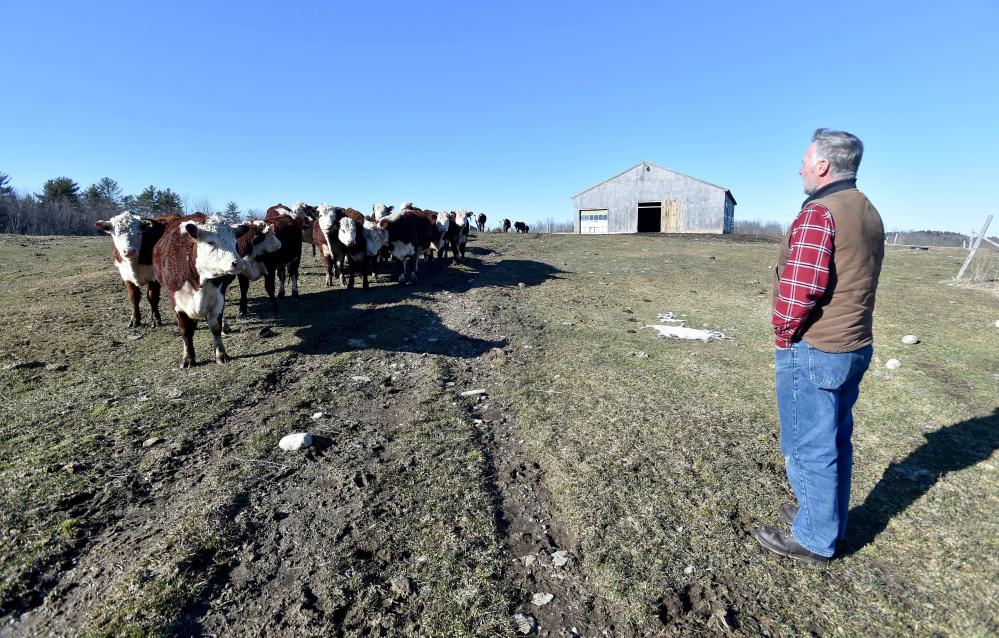SIDNEY — The town will start a committee to discuss how the value of working farmland is assessed in response to concerns from Sidney’s farming community.
Selectmen at a meeting Monday agreed that a group of residents will review the process the town uses to calculate the value of land farmers have put into the state farmland protection program. The move came after fallout from a valuation 10 years ago that was implemented only recently drove up tax bills and the state Monday night raised questions about how the town values farmland.
The state program is intended to preserve working farmland by offering farmers lower property values, and therefore lower taxes, on the land.
When the town went through a property revaluation in 2005, the assessor doubled the per-acre value of farmland in Sidney from $250 to $500, but that value went unrecorded for most property until last year, when the town corrected the error and some farmers’ tax bills doubled. That change has sparked a public debate about farmland values and the town’s commitment to preserving working agriculture.
About a dozen farmers filled a meeting room Monday at the Town Office to talk about the valuation increase, and they pressed selectmen to examine land values further.
Stephanie Gilbert, a farm viability specialist with the Maine Department of Agriculture, Conservation and Forestry, said the way the town revalued farmland in 2005 raised questions.
The town assessor increased the values based on sale prices of farmland in town and applied a blanket per-acre value. But the department recommends towns assess farmland values based on use — for instance, pasture, crops, orchards and blueberries — has recommended per-acre values for land. For example, pasture land, which includes corn and other crops grown to feed livestock, has a range of $100 to $525 per acre value, with a suggested value of $325 per acre.
According to town records, there are 42 parcels of farmland in Sidney with 1,300 acres in total, mostly pasture and woodland, which is valued at the same level as property in Maine’s tree growth program.
Towns have the authority to revalue farmland based on changing commodity conditions, but the department’s recommended ranges have been mostly unchanged since the program was enacted in 1976. The department doesn’t have enough resources to keep tabs on market prices for all crops in the state’s 16 counties, Gilbert said.
Selectman Tim Russell said he thought those values were outdated compared to present land values.
“This clearly is out of kilter for what, real world, is happening now,” Russell said. Selectmen also have a duty to make sure residents are being taxed fairly and evenly, and if people thought it was inaccurate, they could apply for an abatement, he added. Selectwoman Laura Parker said that the town also had a lower tax rate than nearby towns, which made the land value increase a wash.
According to tax assessors, Sidney appears to have one of the highest per-acre values for farmland among nearby communities in Kennebec County.
Out of five communities reviewed Tuesday by the Morning Sentinel, Benton had the lowest values on farmland, with $200 an acre for pasture and $240 an acre for crop land. In neighboring Winslow, the town uses the state’s suggested values — $325 per acre for pasture, $400 per acre for crop land — but Assessor Judy Mathiau said the town had been trying to get the state to revise the suggested values for years.
Fairfield values its crop and pasture land at $400 an acre and values orchards at $650 an acre.
In China, the mean value for farmland is $334 an acre, and in Albion the value is $300 an acre for pasture land and $400 an acre for crops. In Manchester, only one parcel is in farmland protection, but it is valued at $400 an acre for pasture.
Assessment figures for other communities, including Clinton, Windsor and Vassalboro, were not immediately available Tuesday.
Several farmers at Monday’s meeting noted that while taxes and prices have increased, the prices they get for their products has not kept pace. Their farmland also doesn’t cost the town as much as residential land in terms of emergency services, education or infrastructure, and is mostly open to public use for outdoor activities.
Farming is an important part of the town’s character, and residents should decide between preserving traditional livelihoods and open space or encouraging more development, some said.
A broad segment of the community should be involved to discuss farmland values, said Jeff Bragg, a dairy farmer on West River Road, suggesting selectmen set up a committee to investigate the issue further.
“This doesn’t have to be adversarial,” he said.
Peter McGuire — 861-9239
Copy the Story LinkSend questions/comments to the editors.




Success. Please wait for the page to reload. If the page does not reload within 5 seconds, please refresh the page.
Enter your email and password to access comments.
Hi, to comment on stories you must . This profile is in addition to your subscription and website login.
Already have a commenting profile? .
Invalid username/password.
Please check your email to confirm and complete your registration.
Only subscribers are eligible to post comments. Please subscribe or login first for digital access. Here’s why.
Use the form below to reset your password. When you've submitted your account email, we will send an email with a reset code.